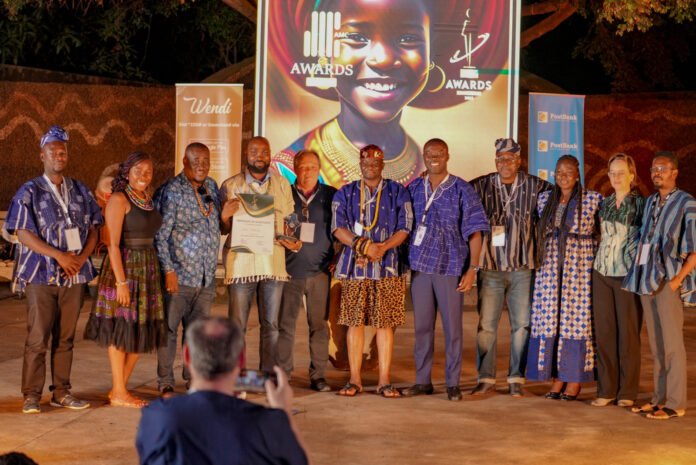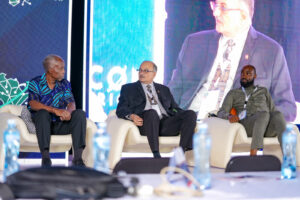
When Louis Amenyo Adanuty was forced to veer off from his initial medical career aspirations to enrol in a computer programming course—he would never have guessed that this path would lead to great success.
“The memories are still fresh. After finishing Senior High School at the Bishop Herman College in the Volta Region where I studied science, I relocated to the capital, Accra, to live with my mother while awaiting my results. To make the most of my time, my parents enrolled me in a six-month diploma course in hardware engineering, and this was when I had my first contact with computers,’’ Louis recalls. That was in the year 2000 when Louis was 18. The only child of his mother, he grew up in Aveme, a small farming community nestled in the Volta Region under the care of his grandmother, a trader, before moving to the city.
After successfully completing the computer program in the same year, Louis received his Senior High School results and passed with a cut-off point that qualified him to read medicine. However, he was faced with a huge obstacle: his family couldn’t gather the funds needed to purchase the admission forms, let alone support him to pursue the course at the University.
He then decided to take up a job at a pharmacy, hoping to save his wages for his education.
“I was so determined to go back to school and I knew that if I could save just enough, I would be fine.’’
Louis worked at the pharmacy as a dispensing officer and a computer technician for three and a half years, and when the customers learnt about his expertise in computer hardware, they would occasionally bring in their faulty laptops to be serviced. It was there that he met Martin Abankwah—a computer programmer who would later become a friend and help him in ways he never imagined.
“What Martin did next had a ripple effect on my life, and I wouldn’t be here today without him and many others like him. It was during one of our conversations that he [Martin] mentioned a job opportunity at the World Bank and advised me to apply, just a few hours before the deadline. It was specifically for individuals with higher academic qualifications such as PhDs and Masters who resided in Africa.’’
Louis had no vast experience in IT when he applied for the consultancy job at the World Bank. All he had was his diploma certificate and the confidence that he was capable of doing the job.
“This was the breakthrough I had been waiting for, and it was nothing short of a miracle. How many people will land such a job at 24 years with little to no experience?’’ quizzed Louis.
Louis worked at the World Bank for two years, from 2006 to 2007. After six months in Washington, D.C., he returned to Ghana to complete the assignment. With the earnings, he bought his first computer and, driven by his growing passion for IT, self-financed a degree in Information and Communication Technology at the Ghana Institute of Management and Public Administration in Accra.
The experience gained during his time at the World Bank had a profound impact on him, and though he now had the financial means to chase his earlier dream of becoming a medical doctor, Louis was now firmly convinced that IT was the path he wanted to follow.
This marked a fresh start for Louis and positioned him to begin his journey into the tech space. In 2009, he started laying the foundation for TekSol, formerly known as Softpro Consult—a software development company with a simple setup: just a dream and a laptop.
From the confines of a friend’s room, he started developing solutions for Freight Forwarders and software for Microfinance Companies across the country. Referrals from satisfied clients led to more people patronizing TekSol’s products.
Five years later, in 2014, the company made headlines when it became the first in Ghana to introduce FundPlus, an investment and fund management software for the local investment banking industry. This proved successful, filling a gap in the market where foreign companies had taken over.
TekSol’s innovations made the company an attractive choice. It was selected by the Ghana Armed Forces from a pool of both local and international companies through a competitive bidding process to provide banking solutions for its Savings and Loans Bank. By 2018, TekSol had expanded its customer base to over one hundred including notable companies like UMB Capital, IFS Financial Services, NDK Capital, SIC Financial Services, Blue Finance, and more.
The company’s efforts started paying off. In 2018 and the year after, TekSol was awarded for being one of the most prestigious companies in the “Ghana Club100” ranking by the Ghana Investment and Promotion Centre. Within that period, Louis was named the Outstanding Software Entrepreneur by the Entrepreneurs Association of Ghana for his contribution to the growth of the country’s Information Technology space.
As TekSol grew, a challenge struck: the 2019 nationwide financial sector cleanup, which led to the revocation of licenses of many financial institutions by the Bank of Ghana, coupled with the COVID-19 pandemic.
“We woke up one day and had lost a staggering seventy per cent of our clientele base. It was shocking and unexpected because we lost millions of cedis, and then came COVID,’’ said Louis with a grin on his face.
But folding up in the face of these challenges was never an option. Louis had learned early on in life about the risks of doing business and was not going to give up on a company he had fought so hard to build with his team.
“Despite the salary delays and other difficulties we faced in the aftermath of the crises, my team stood by me. Not a single person resigned; instead, we regrouped and strategized on the way forward. Out of those meetings, the fintech arm of TekSol, Eganow, was born—ready to revolutionize the financial services industry across the globe.
Eganow is already taking the necessary steps to make this happen: it’s registered in the USA and the UK, with plans to commence operations in these markets soon. Additionally, the company is spreading its wings into Cote d’Ivoire and other parts of Africa.
Today, Louis can afford to smile. What began as a one-man operation in 2009 has since grown into a thriving company with a workforce of over thirty-six people.

Louis Amenyo Adanuty (far right) in a panel discussion at the inaugural (TICON Africa) Conference in Uganda.
In recognition of his work in the tech community over the years, Louis, now 41, was named the 2023 African Tech Business Leader at the inaugural Technology Information Confederation (TICON Africa) Conference in Entebbe, Uganda.
The Ghanaian tech entrepreneur may not have fulfilled his long-cherished dream of becoming a medical doctor, but he has surely carved a niche in the technology space.
“I may not have been able to diagnose human beings, but now, I am diagnosing computers and machines,” said Louis with a smile.









